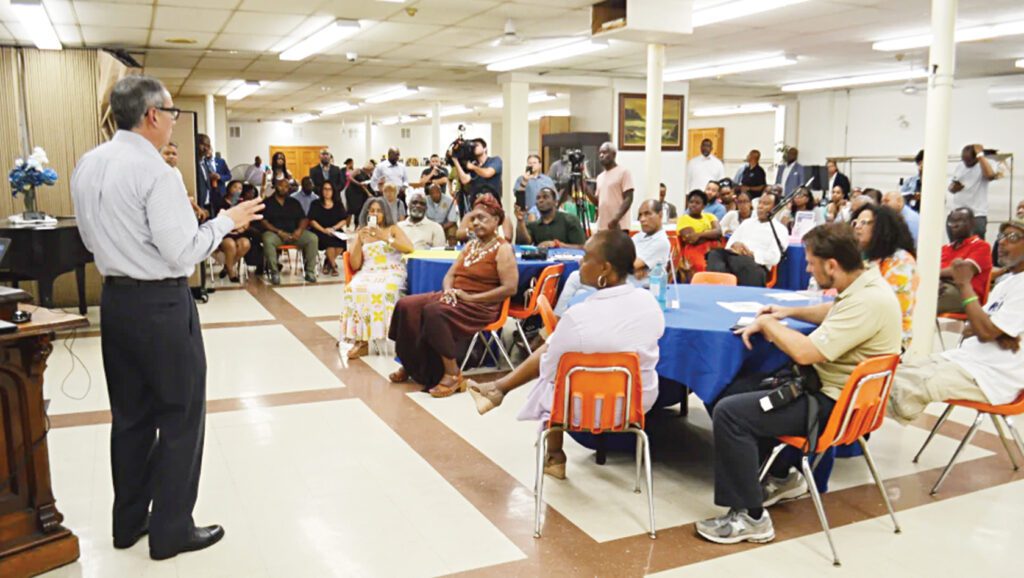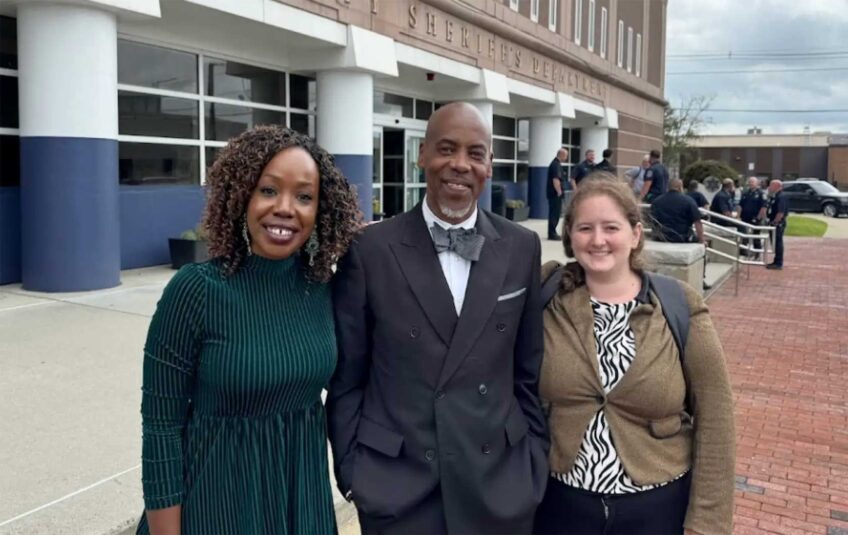
Hundreds of residents, community leaders and local elected officials gathered Wednesday night in the muggy basement of Roxbury’s Twelfth Baptist Church to demand the Boston Police Department and Mayor Michelle Wu provide transparency around the demotion of a veteran police officer.
Eddy Chrispin was well known in Dorchester and Mattapan throughout his 25-year career with the Boston Police. Earlier this month, he was demoted from his rank of deputy superintendent to sergeant detective following his appointment to the Peace Officer Standards and Training Commission, or POST, a state agency dedicated to criminal justice reform.
“What happened to Eddy Chrispin is not a one-off, it’s a symptom of a disease that has festered for decades in the city and state police departments,” former BPD officer Helen Ricci said during the discussion. “We should be asking how to address the underlying culture of supporting and covering for dirty cops.”
At another table, POST Commission Executive Director Enrique Zuniga said he recognizes that the decision ultimately lies with Boston Police Commissioner Michael Cox, who he said owes the public a clearer explanation.
“We just believe that it’s unwarranted,” he said. “[Chrispin] has got a tremendous record, history and experience. If this demotion was warranted for any legitimate reason, they should explain it.”
Boston Police Department spokesperson Mariellen Burns told GBH News last week that Chrispin’s appointment to POST “was a factor in his demotion, but not the only factor.” She did not clarify what other factors contributed to the decision.
In an interview on Boston Public Radio on July 9, Mayor Michelle Wu said Cox gave Chrispin a choice based on a policy that serving both entities simultaneously would prevent a conflict of interest.
“The decision was command staff or POST,” she said, adding that she supports Cox, who “needs to have every ability to shape the team around him.”
At Wednesday’s meeting, Boston City Councilor Julia Mejia vowed to “apply pressure” on Wu for further clarification.
“At the end of the day, she can’t just keep saying that she’s supporting the commissioner and that it’s his decision,” she said. “No, you’re his boss. You have some accountability in that too.”
Councilor Brian Worrell described the situation as “scary” and called for an internal investigation into demotions and disciplinary actions within the department to rule out a possible pattern showing unequal treatment of officers of color.

Rahsaan Hall, president and chief executive officer of the Urban League of Eastern Massachusetts (ULEM), listens as a group of residents and community members discuss police reform in the wake of officer Eddy Chrispin’s demotion. Photo: Tori Bedford/GBH News
“If this is happening to Eddy, what is happening to all the other officers of color and BPD?” he asked. “I think that needs to be brought to light.”
The meeting was organized by a grassroots group of “concerned citizens,” including several community leaders who were part of the city’s 2021 Boston Police Reform Task Force, including advocate Jamarhl Crawford and former state Rep. Marie St. Fleur.
“We were asked to set guidelines and recommendations to enhance enforceability, accountability, trust, [and] transparency and to improve relationships between the Boston Police Department and the Boston community that it serves and protects,” St. Fleur said. “The people of the city of Boston invested their time and sweat sitting in meetings making those recommendations. So those recommendations should therefore be enforced or at least implemented.”
Chrispin also served on the task force. The confusion around his demotion represents a larger issue of complacency and silence in the Boston Police Department, St. Fleur said.
“He was a member of the Boston Police Reform Task Force, appointed to the POST Commission and a champion for police reform,” she said in an interview with GBH News. “If he’s being demoted because of that, it sends a chilling message to the rest of the state, the command staff and the entire police department as to whether or not they can participate in things like this.”
During the meeting, Crawford called for transparency around complaints across the department and pulled up Boston’s Office of Police Accountability and Transparency complaints dashboard, which displayed an error message on an empty page. In 2023, GBH News reported that OPAT, established in 2021 to investigate complaints of police misconduct, had not sustained a single civilian complaint against the department or issued recommendations for disciplinary action.
After serving on the Police Reform Task Force and seeing OPAT become a reality, Crawford said he was hopeful.
“When these things actually got done, I was like, ‘Boy, we’re really on our way, aren’t we?’ But then what happens is these things are crippled to a certain degree because they’re not implemented with full force,” he said. “Some of these bodies or policies do not take advantage of the full force of powers that they have at their disposal, one of which would be the power to investigate independently. You don’t have to wait for a case to find you. You can go find a case.”
Longtime local activist Bill Wright highlighted connections between former Police Commissioner Ed Davis, who resigned in 2013 after facing criticism for disciplining minority officers more harshly than their white colleagues, and current Commissioner Cox: In 2022, Wu appointed Davis to a selection committee that appointed Cox to the position.
“We know that the commissioner and the mayor made a mistake,” Wright said. “This is something that people in Boston should not accept.”
Tori Bedford is a reporter for GBH News.






